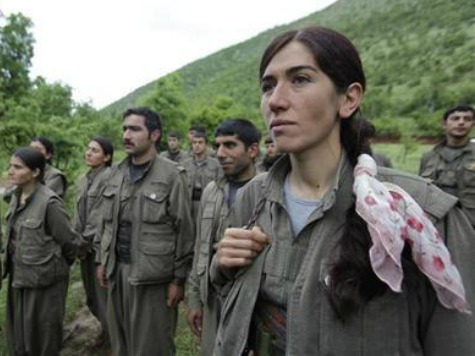
With Iraqi soldiers failing to stop the spread of the Islamic State of Iraq and al-Sham (ISIS), reports indicate the only thing standing between ISIS and Baghdad are Kurdish soldiers blocking key roads to the capital. Kurds also play a key role in Syria, but should ISIS succeed in Iraq, the second battle front may also fall.
The Kurdish ethnic minority in both countries has long had a role in tensions between the governments of both states and Islamist terrorist militias like ISIS. Kurdish separatists on the Syrian-Turkish border benefitted from tensions between President Tayyip Erdogan of Turkey and President Bashar al-Assad of Syria, with the latter lending support. Even without a hand from Assad, however, Kurdish forces’ interests have been in opposition to the spread of ISIS for much of the Syrian civil war.
Last year, as ISIS finalized its messy divorce from the greater al-Qaeda organization, the Syrian Observatory for Human Rights reported that among the last acts that both terror groups were continuing together was to fight against various Kurdish organizations, including the Kurdish People’s Defense Units (YPG) and the Liwa’ Jabhat al Akrad (Kurdish Front Battalion). The jihadist Al Nusra front also joined in fighting Kurdish forces. The two factions traded bombings and kidnappings in key areas, particularly in the provinces of Hasakah and Raqqah.
That fight continues in Syria, where Kurdish fighters appear to only support the Assad regime by virtue of opposing ISIS. YPG spokesman Redur Xelil told Al Monitor that he believed the Assad regime was uncomfortable with the strength of Kurdish troops, but, with ISIS a top priority, such tensions took a back seat. “The regime is trying to weaken the Kurds. They also know we are in a fight with the ISIS. Our fight with ISIS is serving the regime no doubt,” he said.
The fight against ISIS has generated another unlikely ally for the Kurds: the government of Iran. Iran initially sent 2,000 advance troops to Iraq this month to help fight ISIS, and has taken both positive and negative positions on the United States helping defeat ISIS simultaneously. In Syria, Iran has openly supported President Assad and sent military aid to the government in the fight against both ISIS and Assad opponents working independently of jihadist movements.
The de facto alliance between Iran and Kurdish groups may become de jure. Kurdistan Region Premier Nechirvan Barzani visited Tehran last week, according to Iran’s state news agency, Mehr. Barzani discussed ISIS in particular with top Iranian military chief Ali Shamkhani and other senior leaders, hoping to attract further support against ISIS.
This alliance, for now, benefits the United States, as any force keeping ISIS from controlling pivotal territory keeps American allies safe and diminishes an existential threat to free societies in the region. For now, the United States can sit back and send advisory troops because the Kurdish Peshmerga, with help from Iran, control key routes to Baghdad.
ISIS have already declared that their next goal after taking Mosul, Baiji, and other major territories in Iraq is to conquer towns in northern Syria. Doing so would effectively erase the border between the two countries and connect ISIS-controlled lands in Iraq to those in Syria, blocking out Kurdish forces on both sides. It would also allow ISIS to transfer jihadists from the Syrian battlefronts directly into Iraq in numbers potentially capable of overtaking Peshmerga forces. As the following map from BBC shows, ISIS has been strategically building a path from Aleppo to Fallujah that would allow freer transfer of jihadists from one country to the other:

Kurds are concerned that, without outside forces, they will no longer be able to keep ISIS from the many resources a takeover of Baghdad would allow. Barzani told NBC News that the Kurds had previously attempted to convince the Obama administration to help fight ISIS to no avail: “They told us they will put pressure on Iraq and they will tell Baghdad, but nothing happened.”
That strategy has succeeded for as long as ISIS remained only moderately equipped with resources for battle. The United States cannot bank upon the Iranian/Syrian/Kurdish alliance to remain strong in fighting ISIS, particularly if the group manages to join its fronts in northern Iraq and Syria. With Kurdish troops reportedly preparing to call for an independent state in Iraq, the alliance is not guaranteed.
Iran will benefit from the defeat of ISIS, yes– though they may never admit it. While senior government officials claimed that President Obama’s decision to send 300 advisory troops to the region proved he was “not serious” about fighting terrorism, Ayatollah Khamenei himself declared that Iran was against the United States “intervening” in Iraq. That does not diminish the threat that ISIS could pose with the seizure of Baghdad, a threat that not even a lucky alliance could defeat.

COMMENTS
Please let us know if you're having issues with commenting.